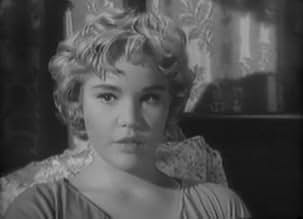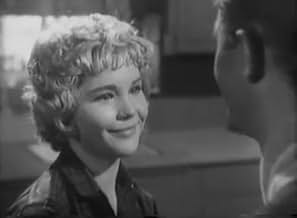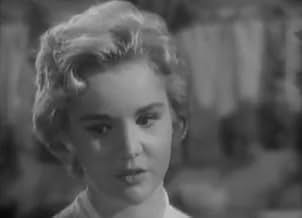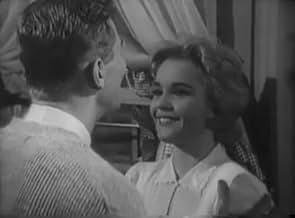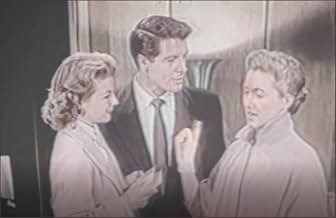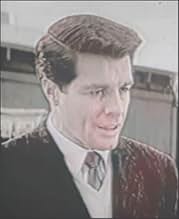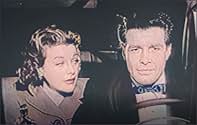अपनी भाषा में प्लॉट जोड़ेंA millionaire indulges himself giving away $1 million apiece to persons he has never met.A millionaire indulges himself giving away $1 million apiece to persons he has never met.A millionaire indulges himself giving away $1 million apiece to persons he has never met.
एपिसोड ब्राउज़ करें
फ़ीचर्ड समीक्षाएं
Apparently inspired by the '30s film "If I Had A Million", this was one of the better TV offerings of the Fabulous Fifties. A mysterious (and obviously eccentric) billionaire, John Beresford Tipton would, each week, write out a check for one million dollars and instruct his manservant Michael Anthony (aka Marvin Miller)to deliver it to its recipient, a total stranger, along with instructions that the lucky individual must never reveal it's source or its exact amount on pain of forfeiture. The scripts were, for the most part, literate and engrossing. In fact, it was reported at the time that some viewers found the premise so convincing that they actually wrote their local TV stations pleading to know where the reclusive Mr. Tipton lived so they could, hopefully, get a similar check. Of course, there were also viewers who actually thought "Mr. Ed" could really talk, but we digress. . . This show was, as already mentioned, one of the better shows back then ( as evinced by it's 5 year run ) and will, hopefully, one of these days, reappear on DVD. We should be so lucky.
John Beresford Tipton: his name evokes patrician wealth and breed. Using his executive secretary, Michael Anthony, Tipton chooses, apparently but not certainly, one person each week at random to receive, tax-free, the sum of one million dollars, in the form of a cashiers check. One million dollars was an enormous sum in the 1950s. And, if one remembers that the top tax bracket (which includes this amount) was 91% at that time, the gift becomes even more phenomenal.
Each recipient was required to sign an agreement never to reveal either the circumstances under which the money was received and the amount, other than to the spouse. (In one episode, a child received the money and a somewhat non-plussed Anthony told the child that he can reveal these details to his parents). The idea of each half-hour show was to see just how receiving the money would affect each recipient. At the end of the show, Tipton would briefly reviews what happened.
An excellent show, far and above the lunacy that pervades television today.
Each recipient was required to sign an agreement never to reveal either the circumstances under which the money was received and the amount, other than to the spouse. (In one episode, a child received the money and a somewhat non-plussed Anthony told the child that he can reveal these details to his parents). The idea of each half-hour show was to see just how receiving the money would affect each recipient. At the end of the show, Tipton would briefly reviews what happened.
An excellent show, far and above the lunacy that pervades television today.
When my grandparents broke down and got a television in the middle Fifties one of the first shows they liked was The Millionaire. I can still hear my grandmother, saying philosophically what a great thing it would be if Michael Anthony rang their doorbell and dropped a million tax free dollars in their laps. My grandparents were immigrants from the Ukraine and no one ever gave them anything. Still it was an entertaining fantasy.
As it was for any number of homes back in the day when the fabulously wealthy John Beresford Tipton whom we never saw, but whose voice was supplied by Paul Frees would summon his secretary Michael Anthony in played by Marvin Miller. With the spacious Tipton estate of Silverstone in the background, Tipton explains to Anthony who will be this week's beneficiary.
The next thing we see is Marvin Miller knocking on someone's door and giving them a check for a million dollars. What that individual did with it was the basis of the episode of that week. That in turn depended on the character of the individual. The variations on human character was the heart of each episode.
Tipton found 205 characters to be generous with for six seasons. Presumably he died or ran out of money. He might have had to sell Silverstone, from what little we saw of it, it looked as grand as San Simeon.
They were good episodes, The Millionaire crammed a lot of plot and character development into a thirty minute show. The players had to be good to convey it. I wish I could see some of those episodes on the TV Land Channel now.
As it was for any number of homes back in the day when the fabulously wealthy John Beresford Tipton whom we never saw, but whose voice was supplied by Paul Frees would summon his secretary Michael Anthony in played by Marvin Miller. With the spacious Tipton estate of Silverstone in the background, Tipton explains to Anthony who will be this week's beneficiary.
The next thing we see is Marvin Miller knocking on someone's door and giving them a check for a million dollars. What that individual did with it was the basis of the episode of that week. That in turn depended on the character of the individual. The variations on human character was the heart of each episode.
Tipton found 205 characters to be generous with for six seasons. Presumably he died or ran out of money. He might have had to sell Silverstone, from what little we saw of it, it looked as grand as San Simeon.
They were good episodes, The Millionaire crammed a lot of plot and character development into a thirty minute show. The players had to be good to convey it. I wish I could see some of those episodes on the TV Land Channel now.
In the days before lotteries, back when having a million dollars meant you were FABULOUSLY wealthy, this show had an interesting and effective premise. An unseen and mysterious multi-millionaire has his servant give a million dollars tax-free to a complete stranger, apparently picked at random. The only conditions were that he couldn't reveal to anyone how he got the money and how much money it was. The rest of the show would follow this person and show how his life was changed by the sudden wealth. The show worked so well because it's writers were able to create an interesting cross section of recipients and consequences. I actually haven't seen this show since it's syndication days in the sixties but it was interesting at the time and I remember it fondly.
Nobody seems to remember that it wasn't actually random people to whom the million dollars was given. At the beginning of each show Tipton would send for his secretary, Michael Anthony. Tipton would say something pertaining to the person he'd decided to give the gift to, and say "Here's another Millionaire." He always knew some reason why the person needed the money or the lesson the money might teach. Anthony would fold the check into his portfolio and head out to deliver it. One episode I still remember had the money going to the young daughter of a contentious couple who needed the money. They found the million dollars notation in her bankbook and told her she shouldn't pretend and write things in the book. At the end of the show they hadn't yet discovered the money was real. It was a good show, fondly remembered.
क्या आपको पता है
- ट्रिवियाThe mysterious philanthropist John Beresford Tipton was named for Tipton, Missouri, the birthplace of producer Don Fedderson's wife, Tido Fedderson.
- भाव
Michael Anthony: [At the opening of each episode, with minor variations] My name is Michael Anthony, and for many years I was executive secretary to John Beresford Tipton, the multi-billionaire whose charity was as boundless as it was mysterious. For it was his hobby to give away anonymously and tax free one million dollars apiece to various people he never knew.
- कनेक्शनFeatured in The Movie Orgy (1968)
टॉप पसंद
रेटिंग देने के लिए साइन-इन करें और वैयक्तिकृत सुझावों के लिए वॉचलिस्ट करें
- How many seasons does The Millionaire have?Alexa द्वारा संचालित
विवरण
- चलने की अवधि30 मिनट
- रंग
- पक्ष अनुपात
- 1.33 : 1
इस पेज में योगदान दें
किसी बदलाव का सुझाव दें या अनुपलब्ध कॉन्टेंट जोड़ें


